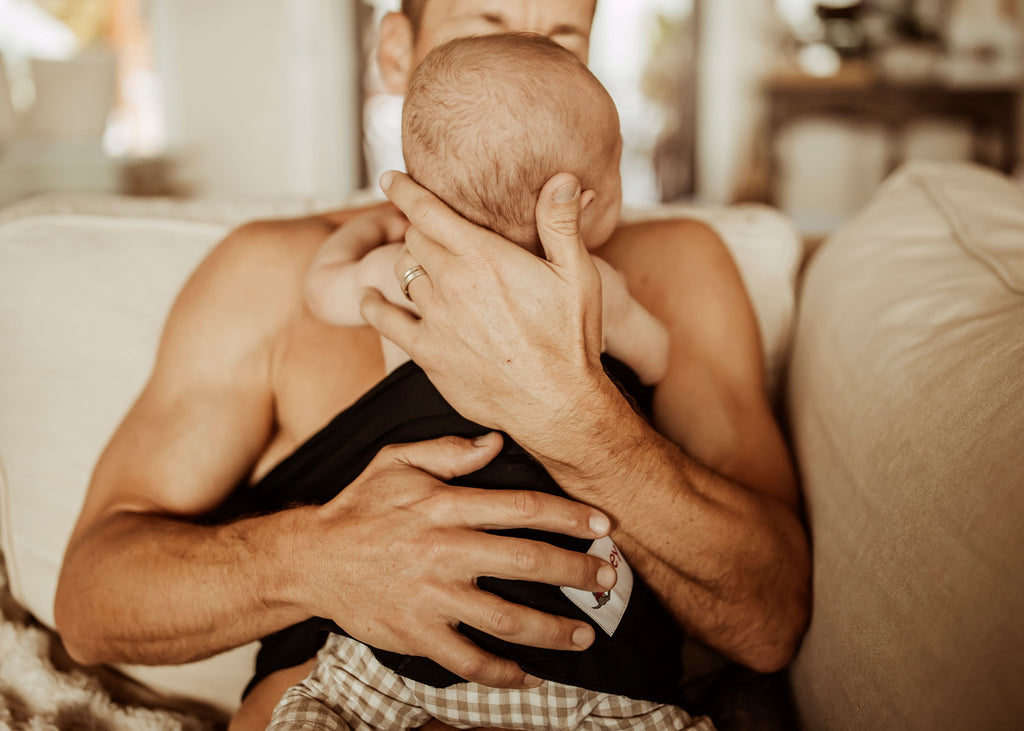Because the benefits of skin-to-skin include breastfeeding, pain relief and bonding, the practice can be misinterpreted as exclusive to moms and babies.
However, the truth is that skin-to-skin supports your baby’s development no matter whose arms they’re in. In fact, since 30% of hospitals across the US unfortunately don’t yet support immediate skin-to-skin for post C-section mothers - it’s important that dad is there to step in.
There are many reasons why skin-to-skin time is as important for dad and baby as it is for mom. Here are some of the ways skin-to-skin care benefits fathers and babies born via C-section.
It helps to Stabilize Baby’s Heart Rate
In many countries, C-section babies are placed in neonatal units immediately after they are born, while their mothers recover from the use of general anesthetic. However, a new study, conducted by researchers in Sweden, recommends that newborn babies should have skin-to-skin contact with their fathers while the mother is recuperating from a Cesarean birth.
Skin-to-skin Contact Releases a Hormone Necessary for Bonding
While mothers have had nine months to bond with their baby before they’ve even arrived, it's common for some dads to feel a little lost when it comes to navigating father-baby bonding.
Skin-to-skin contact is one of the simplest and most effective ways for fathers to bond with their newborns. Research by Dr. Nils Bergman shows just 30 minutes of skin-to-skin with their babies actually rewires the brain.
When a father brings their baby to their chest, Oxytocin, often referred to as the 'love' or 'feel-good' hormone, is released. The father’s testosterone levels also decrease, making himself and baby feel lighter, more relaxed and at ease when sharing these new and special moments.
In turn, this helps dad to respond in a nurturing and affectionate way toward baby and create a stronger bond. With a higher sensitivity to and awareness of baby’s needs, dad is likely to feel more tuned-in to his infant and more confident about their parenting skills.
It Keeps Baby Warm and Provides Comfort
One of the most widely reported benefits of skin-to-skin contact is its effectiveness in keeping baby warm. It also helps to soothe baby, with babies who are held skin-to-skin being 12 times less likely to cry.
However, while a woman’s biological breast tissue automatically adjusts to regulate baby's body temperature - making baby cooler or warmer - an individual without breast tissue - for example, the baby’s father - only heats the baby. It's therefore recommended that dads only hold their babies skin-to-skin for sixty minutes at a time to avoid causing your newborn to overheat.
Your Newborn Baby’s Stress Levels Become Lower, and Physiological Development Increases
Emerging into the world after nine months in the dark comfort of the womb is pretty stressful for babies. Skin-to-skin contact helps your baby to feel safe, and they will also be able to hear and recognize familiar sounds, like their father’s voice.
Studies show that babies who are held skin-to-skin are more physiologically stable than babies who aren't. In addition to less crying, skin-to-skin with dad can cause baby's cortisol levels (also known as the stress hormone) to drop after only 20 minutes of being held. It also helps to stabilize your baby's breathing, heart rate, blood sugar levels and even lower their pain response.
We hear a lot about how skin-to-skin contact boosts a baby’s immune system when held by their mothers - and the same is true for when they are held by their father. A father’s immune system is able to pass antibodies from their skin, making their baby more resistant to illness - helping them more resilient now, and well into the future.
Follow us on Facebook, Twitter or Instagram, or subscribe to our newsletter for our latest news and updates and useful, baby-handling knowledge from our experienced Joeyband™ team.

